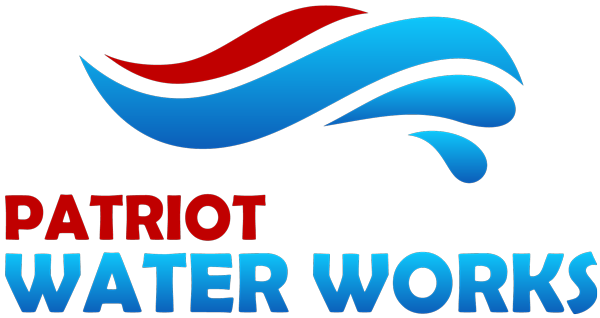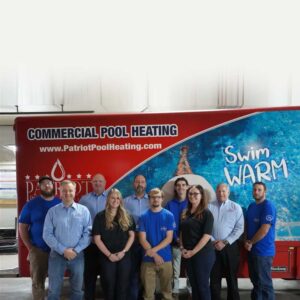Preventing Raypack Heat Exchanger Failure
Just imagine the worst possible outcome: You turn on the ancient pool heater, but the pressure spikes, the water is only lukewarm, and there may be a rising trickle of water dripping from the heater’s cabinet. This is the classic case of a heat exchanger that has failed or is going to fail, as anyone who has experienced this can testify to the frustration.
Patriot Water Works, located in Lancaster Pennsylvania is available to make sure this doesn’t happen. With our vast experience, here are some tips on what NOT to put your heater through.
What is a Raypack Heat Exchanger?
A heat exchanger is a network of metal-alloy tubes used to heat or cool water by transferring thermal energy from an external source.
Three different kinds of materials can be used to make heat exchangers: copper, cupronickel, and titanium. Copper is most often used as a heat exchanger. The soft metal is the one that transfers heat the best out of the three. Copper’s main flaw is that it breaks easily in different kinds of water.
Cupronickel, which is stronger, is also used in gas heaters and can be used safely in salt pools and water that is not as clean. Heat pumps are the only things that have ever used titanium heat exchangers. This is because, of the three exchanger materials, they are the most durable.
What to Avoid with Raypack Heat Exchanger in Pennsylvania
Faulty Plumbing
The check valve is a device that lets water flow through but stops the flow when the water stops moving. When the water stops flowing, the spring-loaded flapper closes. This keeps water from going back through the chlorinator and settling in the heater. Always install the chlorinator after the heater. If you install the heater and chlorinator in that order, undiluted chlorine won’t get into the exchanger and rot it. If your pump stops working, the water will stand still and may even flow backward out of the chlorinator and settle in the exchanger.
For more tips on troubleshooting pool heaters, click here:
High Concentration of Chlorine
The best way to get rid of bacteria, microbes, and other unwanted amoebas in your pool is to use chlorine. But this great ability to clean has the bad effect of causing corrosion. If the heat exchanger is exposed to high levels of free chlorine above 5 ppm for a long time, it will break down and stop working before it should.
Unsatisfactory Balanced Levels
The rule of thumb is correct levels are:
· Calcium Hardiness- 250 to 400ppm
· Total Alkanlinity – 100 to 150 ppm
· Pool PH levels- 7.4 to 7.8 is optimal
If these balancers don’t stay within the ranges that have been set, copper heat exchangers can start to break down in a few months. But it shouldn’t be hard to keep them in these ranges since they are the basis of pool water chemistry.
High TDS Levels (Total Dissolved Solids)
Total dissolved solids (TDS) is the measurement of everything that has dissolved in your pool water, such as salt, calcium, organic material, and balancers (i.e., soda ash, and sequestered metals.) It is a way to measure how full your water is. When there are a lot of charged minerals in the water, they wear away copper tubes quickly.
· TDS should be below 3000 ppm
· Salt chlorinated pools can be 6000 pm or less
Lowering the TDS level can be achieved by replacing some of the water in the system with fresh water.
Miscellaneous Tips for Less Damage of Raypack Heat Exchanger
Bonding your pool equipment is a must if you want to protect it and the people who swim in it. By bonding the pool and its equipment, stray electricity can’t hurt anyone or anything.
Never put chlorine tablets in your pump or skimmer basket. Any pool owner in Pennsylvania should follow this rule, not just those whose pools have heaters. Even when diluted to 5 parts per million (ppm), chlorine is very corrosive. When you put your chlorine tablets in the skimmer or pump basket, you are putting undiluted chlorine directly into your pump, filter, and heater. That chlorine will not only rot your heat exchangers, but it will also dry out and break down the plastic parts inside your equipment.
The salt level should not exceed 4500 ppm. When the salt level is too high, there will be too much scaling, which can block the copper tubes in the exchanger. Keep your salt level between 3000 and 3500 parts per million (ppm). This is where most salt chlorine generators work best.
For more information on water management, click here.
Patriot Water Works, Pennsylvania
Patriot Water Works is a full-service aquatics company in Pennsylvania that offers holistic solutions. We offer years of experience in the hydronic and aquatics industries, so we can help with plumbing, electricity, system design, and water quality. We work closely with engineers, architects, and manufacturers to reduce energy use, increase comfort, make equipment last longer, and get the best return on investment (ROI) possible. We also build high-efficiency water heating, space heating, and cooling systems. From our headquarters in Lancaster, Pennsylvania, we work with business and industrial clients all over the country. Contact us today to schedule a consultation for all your aquatic needs.



